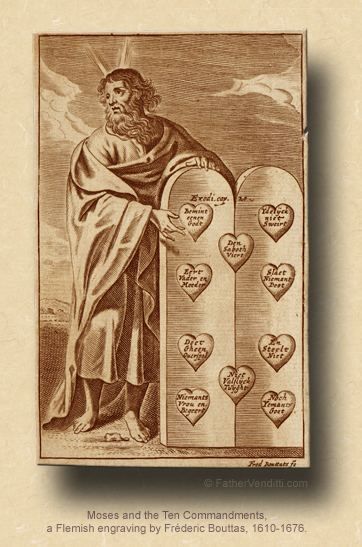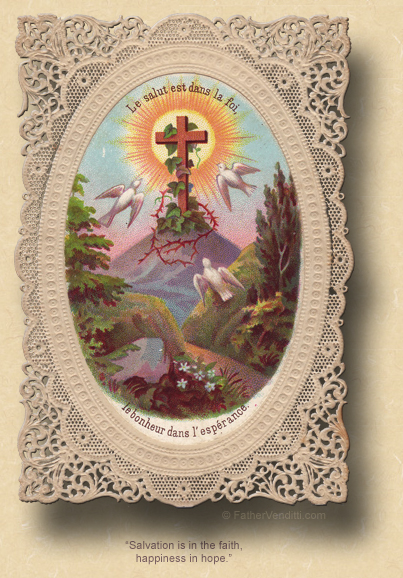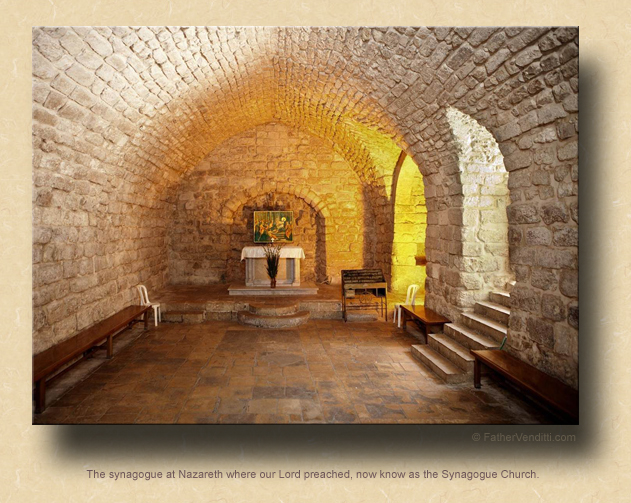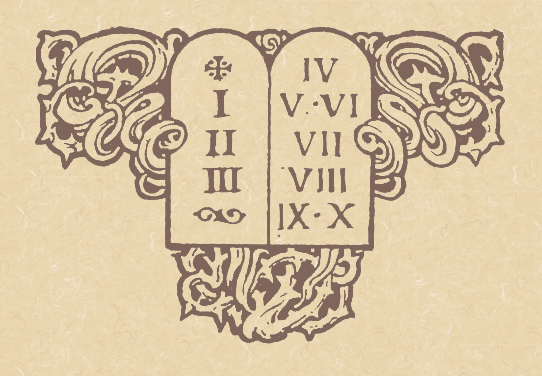The Law of the Lord is Perfect, Refreshing the Soul….
The Third Sunday of Ordinary Time.
Lessons from the tertiary dominica, according to the ordinary form of the Roman Rite:
• Nehemiah 8: 2-6, 8-10.
• Psalm 19: 8-10, 15.
• I Corinthians 12: 12-30.
[or, 12: 12-14, 27.]
• Luke 1: 1-4; 4: 14-21.
The Third Sunday after Epiphany.
Lessons from the dominica, according to the extraordinary form of the Roman Rite:
• Romans 12: 16-21.
• Psalm 101: 16-17.
• Matthew 8: 1-13.
FatherVenditti.com
|
 12:53 PM 1/23/2022 — I want to begin today with our first lesson from the oft-overlooked book of the Prophet Nehemiah, one of two historical works—the other being Ezra—that cover a one hundred year period following the Edict of Cyrus in 538 BC, which allowed the Jewish people to leave captivity in Babylon and return to Jerusalem. Cyrus the Great, the Emperor of Persia in modern day Iran, had conquered the kingdom of Babylon, and one of his first acts was to release the Jews from bondage and send them home. The problem was that the Jews, during their long centuries of captivity, had become corrupted, intermarrying with pagans, forgetting and abandoning their faith, falling into sinful ways. Ezra became their self-appointed leader, and soon realized that the Jews couldn’t very well return to Jerusalem, now in ruins, and restore their once-great kingdom without the help of God, which meant that they needed to rediscover their faith. The take-away for us is how the forgiveness of our sins is offered to us only as a result of genuine sorrow. Ezra felt that sorrow deep within him, and knew that there would be no point in rebuilding the temple until his people were, once again, worthy to enter it, just as we must beg mercy from our Blessed Lord with a real and true contrition if we are to approach our Lord in the Blessed Eucharist worthily; this is what we call a “purpose of amendment,” which is a necessary condition for a valid confession. It doesn’t mean that must promise never to commit the sin again; it means only that we will not rationalize and will do our best. Let us beg our Blessed Lord to give us that true contrition so that we can confess our sins sorrowfully and receive Him worthily. 12:53 PM 1/23/2022 — I want to begin today with our first lesson from the oft-overlooked book of the Prophet Nehemiah, one of two historical works—the other being Ezra—that cover a one hundred year period following the Edict of Cyrus in 538 BC, which allowed the Jewish people to leave captivity in Babylon and return to Jerusalem. Cyrus the Great, the Emperor of Persia in modern day Iran, had conquered the kingdom of Babylon, and one of his first acts was to release the Jews from bondage and send them home. The problem was that the Jews, during their long centuries of captivity, had become corrupted, intermarrying with pagans, forgetting and abandoning their faith, falling into sinful ways. Ezra became their self-appointed leader, and soon realized that the Jews couldn’t very well return to Jerusalem, now in ruins, and restore their once-great kingdom without the help of God, which meant that they needed to rediscover their faith. The take-away for us is how the forgiveness of our sins is offered to us only as a result of genuine sorrow. Ezra felt that sorrow deep within him, and knew that there would be no point in rebuilding the temple until his people were, once again, worthy to enter it, just as we must beg mercy from our Blessed Lord with a real and true contrition if we are to approach our Lord in the Blessed Eucharist worthily; this is what we call a “purpose of amendment,” which is a necessary condition for a valid confession. It doesn’t mean that must promise never to commit the sin again; it means only that we will not rationalize and will do our best. Let us beg our Blessed Lord to give us that true contrition so that we can confess our sins sorrowfully and receive Him worthily.
That being said, today’s first lesson is the climax, more or less, as Ezra reads to the people from the Law of Moses which they had so long ago forgotten. Hearing it, they are reminded of everything God had done for them over the centuries, and are filled with remorse for their sins and begin to weep, but Ezra and Nehemiah exhort them to rejoice and celebrate instead, because they have rediscovered that which gave them their identity as a people. As our responsorial Psalm says: “The Law of the Lord is perfect, refreshing the soul…” (Psalm 19: 8 RM3).
Sometimes we can feel very much like the Jews newly released from captivity: confused, aimless, feeling without purpose or direction, not knowing what to do, where they’re going or even where they’ve been.
But just as the Jews of Ezra’s time found new hope in a faith long ago forgotten, so can we, and offer that faith and that hope to others along the way.  That, perhaps, is the silver lining to all personal tragedies: that they cause us to raise our eyes up from the mundane and temporary things of this world to gaze upon heavenly realities. It helps us to put the personal crosses we all carry into perspective, and renews our appreciation for the things that truly matter. That, perhaps, is the silver lining to all personal tragedies: that they cause us to raise our eyes up from the mundane and temporary things of this world to gaze upon heavenly realities. It helps us to put the personal crosses we all carry into perspective, and renews our appreciation for the things that truly matter.
Let us ask our Blessed Lord today to shower down His graces upon those who suffer, and take into our hearts the words spoken by the Levites: “Do not be saddened this day, for rejoicing in the Lord must be your strength” (Neh. 8: 10 RM3).
With regard to today’s Gospel lesson: Matthew and Mark mention very matter-of-factually that Jesus, upon returning to His own town—or, as Mark puts it, “his own country” (6: 1)—began to teach in the synagogue on the sabbath, and they both make mention of how everyone was impressed with His preaching. It's not surprising. I remember the first time I went home to preach in my native parish: everyone comes up afterward to tell you how wonderful it was. Of course they're going to say that; you're the home town boy. For some reason, Saint John ignores this event altogether; Saint Luke, on the other hand, is the only one of the Evangelists who actually tells us what the sermon was about.
It's important that we put this synagogue visit into its proper context. Back toward the beginning of Advent, in speaking about John the Baptist, I had mentioned how there were two distinct classes of rabbis in our Lord's time: the traditionalist wing of the rabbinical class called the Sadducees, and a more progressive group which is first evidenced in the Books of Maccabees, just sixty years or so before the time of our Lord, called the Pharisees. The Pharisees were radical in a number of ways, but two elements of their theology stand out: they preached a resurrection from the dead, which the Sadducees rejected; but, more to the point, they instituted the synagogue service which enabled the Jewish people to gather for prayer on the sabbath without making the journey to the temple in Jerusalem. But synagogue worship was very different from temple worship. The service in the temple was a sacrifice: an animal, usually a lamb, was slaughtered and burned on the altar. The synagogue service was not a sacrifice: it consisted of reading from, then commenting on, the Holy Scriptures; and, this really angered the Sadducees. The Sadducees viewed the synagogue service in much the same way that you and I would view a Protestant service: they read from and talk about the Bible, but there's no sacrifice, so it's not real, and therefore not pleasing to God. That's exactly how the Sadducees viewed the synagogue.
We often like to view the Pharisees as our Lord's primary nemesis, because they're always challenging Him about things He's said or things He's done; but, in reality, He and His disciples all came out of the Pharisaical tradition. Jesus preached a resurrection from the dead—although the resurrection He preached was to be His own—and He and His disciples all worshiped in the synagogue every single sabbath; and, sometimes I don't wonder that the reason the Holy Gospels show our Lord clashing with the Pharisees so much more frequently than with the Sadducees is because the Pharisees know that our Lord is basically on their side, and don't understand why He continues to do things of which they don't approve, whereas the Sadducees would consider our Lord a lost cause and not worth engaging.
The synagogue service was very orderly and regimented. It began with the Shema prayer from Deuteronomy 6: 4: שְׁמַע, יִשְׂרָאֵל: יְהוָה אֱלֹהֵינוּ, יְהוָה אֶחָד. (Sh'ma Yis'ra'eil Adonai Eloheinu Adonai echad): “Hear, O Israel! The Lord is God. The Lord is One.” Then would follow readings from the five Books of Moses, lessons from the early prophetic books of Joshua, Judges, 1 & 2 Samuel, 3 & 4 Kings, and sometimes from the later prophets, all done in Hebrew, and all done according to a lectionary for the season of the year, just as we do at Holy Mass. Then there was a sermon in the vernacular language, in the case of the synagogue in Nazareth, Aramaic; and it did not have to be a member of the rabbinical class who preached the sermon: any learned man could be called upon to do this, and our Lord was certainly a very prominent and learned man. He returns to Nazareth after performing His first miracle in Cana—which is traditionally included in the commemoration of the Epiphany—and had become famous with a trip to Jerusalem during which He made headlines by driving the money lenders out of the temple; so, in these early days, our Lord was very much in demand, and was frequently asked by presidents of synagogues to preach, which is why His Apostles often addressed Him as “Rabbi.” Now, He was coming home to visit His own home-town synagogue, and everyone who was anyone was going to be there.

So, He finally arrives as arranged to preach at the service. As Saint Luke begins his account, the שְׁמַע, יִשְׂרָאֵל has already been prayed, the readings from the prophets are finished, and our Lord has to decide which of them he's going to preach about. He's handed the scroll of the Book of Isaiah. It's not clear whether he reads from it or simply recites it from memory, because he quotes for them the first two verses of chapter 61, but adds a few words from chapter 58:
Rolling up the scroll, he handed it back to the attendant and sat down, and the eyes of all in the Synagogue looked intently at him. He said to them, “Today this Scripture passage is fulfilled in your hearing” (Luke 4: 20-21 RM3).
I don't think that was the totality of our Lord's homily—he probably had more to say than that—but that's all Saint Luke tells us, aside from the fact that everyone was very moved and, as the Evangelist puts it, “were astonished at the gracious words which came from his mouth” (v. 22 Knox).
Following the homily there was a symbolic offering of bread and wine in the manner of the Old Testament example of Melchizedek, in Hebrew called the בְּרָכָה (berakhah), and the prayers used for this have become part of the Holy Sacrifice of the Mass: at the Offertory, the priest prays two nearly identical prayers, once over the bread and once over the wine, usually in silence, but if there is no hymn he is allowed to pray them out loud. They begin with the words, Benedictus es, Dómine, Deus universi…—“Blessed are you, Lord God of all creation…”, lifted word for word from the synagogue service of our Lord's time.
I think it's beneficial sometimes to reflect on the fact that the Holy Sacrifice of the Mass is not simply a prayer of devotion in the manner of our Rosary or our Divine Mercy Chaplet or our other devotions. Every word, every gesture, has a theological meaning and an historical context even if most of us have forgotten what they are, which is why it's incumbent upon priests and lay people alike to offer the Holy Sacrifice with precise attention to detail and not casually. For example—and I have mentioned this before—there are specific points in the Mass where the priest extends his hands.  This act symbolizes the priest collecting the prayers of the congregation and sending them upward toward heaven, but it is a specifically priestly gesture. You may have noticed, if your parish enjoys the services of a deacon, that whenever the Deacon says, "The Lord be with you," he does not extend his hands; he's not allowed to, because he's not a priest. Deacons can do a lot of things: they can baptize people, they can perform weddings, they can bless religious articles, they can even give Benediction of the Blessed Sacrament, but they can't extend their hands in public prayer because they are not priests. This act symbolizes the priest collecting the prayers of the congregation and sending them upward toward heaven, but it is a specifically priestly gesture. You may have noticed, if your parish enjoys the services of a deacon, that whenever the Deacon says, "The Lord be with you," he does not extend his hands; he's not allowed to, because he's not a priest. Deacons can do a lot of things: they can baptize people, they can perform weddings, they can bless religious articles, they can even give Benediction of the Blessed Sacrament, but they can't extend their hands in public prayer because they are not priests.
That's one of the reasons—not the only one—I like offering Holy Mass ad orientem from the front of the altar: because it disturbs me to see people holding up their hands during the Our Father; that belongs to the priest alone because he is collecting up the prayer of the faithful and sending it heavenward. The very same thing holds true when the priest offers a liturgical greeting, briefly extending his hands when he says, “The Lord be with you.” It is quite improper for the laity to respond by making the priestly gesture back at him when they say, “And with your spirit.” I can't believe that a priest ever taught people to do that; I think it's more likely that someone thought it made sense to him and started to do it, and we may have seen it and thought it was something meaningful. But when we're at Mass, we're not carrying on a casual conversation, nor was it ever intended that elements of the Mass imitate every day life. And I know that lay people are not attuned to thinking of the liturgy as something that requires obedience from them, but that's because we've gone so many generations now without any formation in our religious education programs on how to hear Mass properly. Do whatever you want when you're praying on your own: flap your arms, fly around the room, blow smoke out of your ears, I don't care; but, when we're celebrating together the sacred liturgy we don't do what's meaningful to us, we do what has been handed down to us over the centuries.
In the old days, we were taught in our catechism that the Mass was kind of like a time machine: the Sacrifice only appears to be offered here and now; in reality, it was only offered once on the Cross, and we are made present to it, and participate in it, by means of a miracle that transcends time and space. And that's very true.
So, let's consider our Blessed Lord's faithful participation in the liturgy of His day, as recounted for us today by Saint Luke. Of course, the synagogue service in Nazareth was nothing compared to the real Sacrifice of our Lord's Sacred Body and Precious Blood, which He would offer for the Apostles at the Last Supper, and ratify for all of us with His death on the cross. But if our Lord felt it was important enough to faithfully adhere to a service that was only a symbol, how much greater attention should we give to one that is real?

|

